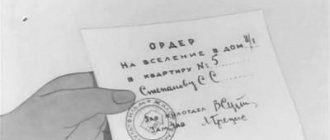In accordance with paragraph 1 of Article 720 of the Civil Code of the Russian Federation, after the period established by the contract for the performance of work or services has expired, the customer is obliged to accept the result and draw up a certificate of completion of work. But it often happens that the result presented by the contractor does not suit the customer and he refuses to accept it.
This action must be accompanied by a reasoned refusal to sign the work completion certificate, otherwise an unscrupulous contractor will be able to demand payment of a penalty under the contract in court.
What it is?
A reasoned refusal to sign a certificate of work performed or services rendered is a document that describes in detail the reasons for the customer’s refusal to fulfill its payment obligations. It is drawn up in cases where the contractor has fulfilled its obligations in an improper manner, but at the same time insists on acceptance of the result by the customer and payment of payment under the contract.
If the appropriate document is not drawn up, the contractor will be able to go to court with the allegation that the customer is deliberately evading acceptance in order to avoid payment for work or services provided in accordance with a previously concluded cooperation agreement (find out what the contractor should do if the work is completed, but the customer does not sign the certificate of completion (click here). The contractor will also be able to demand payment under a unilateral act drawn up in accordance with Part 2 of Article 753 of the Civil Code of the Russian Federation.
The document must be drawn up by specialists not only from the legal department, but also from the production department , since the document requires an extremely detailed description of all the technical nuances and rules for performing individual work. The data received from the production department is sent to lawyers, who confirm it with references to current regulatory documents, check it and forward it to representatives of the contractor company.
Drawing up this document is the only legal way to refuse payment under the contract if the work or services were performed poorly.
Features for government contracts
If the winning bidder has provided false information or does not actually meet the requirements from the procurement documentation, the customer has the right to refuse to sign the government contract unilaterally (clause 9 of Article 31 of the 44-FZ). Such a reasoned refusal to conclude a contract based on the results of bidding also arises in the following cases:
- if the supplier has offered selling prices for vital and essential drugs that are not registered or exceed the maximum selling price (clause 10 of article 31 of 44-FZ);
- if the contractor refuses to reduce the price for vital and essential drugs to the established value of the maximum selling price (if purchases are made from the National Medical Center for Federal needs over 10 million rubles and from the National Medical Center established by a constituent entity of the Russian Federation for municipal needs).
If the winner of the order produces the medicines themselves, then the price does not matter. If the parties unlawfully refused a government contract, they face a fine of 50,000 rubles (Part 3 of Article 7.32 of the Code of Administrative Offenses of the Russian Federation, decision of the Federal Antimonopoly Service of Russia in case No. K-1799/17 of December 27, 2017). If the customer unreasonably unilaterally refused the contract, the contractor has the right to force him to sign and demand recovery of damages through the court (Part 1 of Article 107 44-FZ, Clause 4 of Article 445 of the Civil Code of the Russian Federation, Resolution of the Arbitration Court of the North Caucasus District No. F08-1015/2018 in case No. A32-13476/2017 dated 04/10/2018).
How to draw up a document?
The refusal must be drawn up in the format of a separate document in two copies - one is sent to the contractor at his legal address, and the second remains in the hands of the customer.
A reasoned refusal cannot be formalized with a corresponding inscription on the previously drawn up acceptance certificate - it is necessary to draw up a separate document.
In order for a document to have legal force, it must contain the following information:
- Full title of the document.
- Date of inspection.
- Link to the contract. This section must necessarily indicate all additions to the agreement (if any) and details of all listed documents.
- Reasons for refusal. They must be described in as much detail as possible - this will make it possible to accurately calculate the losses incurred by the customer and win the case after it is sent to court.
- The text should also include references to those clauses of the contract and specification sections that describe violations of the quality of the work performed.
- It is also necessary to include in the text references to regulatory legal acts, according to which the customer has the right to refuse to accept poorly performed work (including Article 720 of the Civil Code of the Russian Federation).
- In conclusion, you must indicate the position, full name, and signature of the employee who conducted the inspection.
- The document must bear the company seal (if any).
If the document is certified by an employee by power of attorney, you should make sure that it stipulates his right to conduct an inspection and accept the work performed, as well as to draw up documents, including a reasoned refusal.
If the text of the employee’s power of attorney does not directly indicate the phrase “Motivated refusal,” the risk of losing the case in court will increase significantly.
When applying, it is important to describe in as much detail as possible all the existing deficiencies found during the inspection. It is on the basis of this document that the court will decide exactly what volume of work was actually completed, assess the quality of the work, as well as the damage caused to the customer by the fact that the contractor performed his duties improperly.
In addition, if the reasons specified in the text are considered by the court to be insufficiently disclosed, the refusal may be considered unmotivated, and, therefore, the customer will have to fully compensate the contractor for all losses incurred as a result of the proceedings.
When drawing up a document, you need to pay attention to the basic design rules:
- When drawing it up, the customer must provide references to those clauses of the contract that were violated by the contractor. Only in this case will the document have legal force and protect the injured customer from having to pay for poorly performed work. When drawing up the act, extremely clear, unambiguous language must be used.
- It is not enough in the text to indicate organizational components as deficiencies - it is necessary to describe specific defects discovered by the customer upon acceptance.
If most of the reasons indicated by the customer as grounds are classified as organizational, there is a high probability that the refusal will be considered unmotivated, and the court will side with the contractor, obliging the customer to compensate for the losses incurred by the contractor. - The refusal must be sent to the contractor only with the obligatory preservation of all absentee documentation that can confirm the fact that the requirements have been sent to the contractor.
In judicial practice, there are often cases when a well-drafted, from a legal point of view, motivated refusal was not taken into account by the court during the proceedings due to the fact that the customer could not prove the fact of its timely dispatch. You can prove that the document was sent on time by saving the register of postal items, receipts issued at the post office when sent, etc.
We do not recommend completing the documents yourself. Save time - contact our lawyers by phone:
8 (800) 350-14-90
What to do if the act is drawn up, but the work was carried out poorly or was not completed
A contractor’s violation of his duties can manifest itself in two ways:
- the scope of work performed does not correspond to that stated in the agreement;
- the consumer has complaints about the quality and (or) the amount of the declared cost.
In both cases, the consumer must notify the contractor immediately, otherwise he loses the right to rely on the defects discovered by him. The act of poor-quality (unfulfilled) work is a form of notification, since it contains the signatures of both parties.
After a protocol of existing defects has been drawn up, the parties agree on further actions. According to Art. 723 of the Civil Code of the Russian Federation, the consumer has the right to demand:
- free elimination of defects;
- proportionate reduction in cost;
- reimbursement of own expenses if the customer takes care of their elimination.
Attention! If payment under the contract has not been made, and the customer is not satisfied with the results, he must write a reasoned refusal to pay, in which he must additionally list the identified shortcomings. In the absence of a reasoned refusal, the customer is obliged to make payment within the period specified in the contract.
Free legal consultation
+7 800 350-51-81
If the contractor does not admit the existing deficiencies, either party may request an examination. If its conclusion confirms the presence of defects, the cost of the examination shall be borne by the contractor. In the event that the examination does not reveal the presence of deficiencies or certifies that they did not arise due to the actions of the contractor, the costs will be borne by the party that initiated the examination.
If, as a result of negotiations and examination, the parties do not come to an agreement, then the problem is resolved in court. Any of the counterparties can file a claim with the court.
What is a fictitious act
Sometimes the parties draw up a fictitious deed, that is, the consumer accepts the work in advance or “blindly”. Most often this is done to avoid taxes or to save time. Such actions put the customer himself in an awkward position. If the work is performed poorly, it becomes more difficult for him to make claims to the contractor, since formally acceptance has already taken place and the document does not contain claims against the contractor.
In such a situation, the customer should submit a written claim to the contractor. It must contain the following provisions:
- revocation of the customer's signature on the acceptance certificate;
- requirement to correct identified defects;
- warning about suspension of payment under the contract.
If payment is not made, then filing a claim and suspending payment under the contract is usually sufficient to resolve the problem. If payment has already been made, the customer finds himself in a more difficult situation. He needs to send a complaint to the customer, indicating his reasons. If he refuses to fulfill the contract or cancel the agreement and return the money, he will have to go to court.
Carefully! Judicial practice shows that the chances of winning or losing a case in such a situation are approximately equal. The court can either literally interpret the provisions of Article 720 of the Civil Code of the Russian Federation, or be guided by the position expressed in the letter of the Presidium of the Supreme Arbitration Court No. 51 dated January 24, 2000, according to which the customer is not deprived of the right to appeal the quality, volume and cost of work even if the acceptance certificate has already been signed.
Responsibility and consequences for the customer if the document was not sent
If a reasoned refusal is not sent to the contractor in a timely manner, he may consider that the customer is deliberately avoiding accepting the work and paying the fee under the contract. In such a situation, the contractor has the right to file a claim in court, and the likelihood that the decision made by the court will be contrary to the interests of the customer increases.
Most often, when drawing up construction contracts, they include a clause stating that the work will be paid only in cases where it is performed efficiently (in accordance with Article 711 of the Civil Code of the Russian Federation).
If defects were discovered during the acceptance of work, the customer must notify the contractor.
If the latter admits his guilt and is not in the mood for confrontation, then having received a refusal, he invites the injured party to draw up a bilateral act listing the detected defects and a protocol with an agreed upon time frame for their elimination.
If the contractor refuses a peaceful settlement and refuses to voluntarily eliminate the detected deficiencies, the customer will have to go to court, where a reasoned refusal will become the main evidence of his innocence.
An important part of the work process is the delivery and acceptance and signing of the relevant act. In order for both parties to be satisfied, everything needs to be done properly. From our materials you will learn why and how intermediate acts are drawn up, surveys of work performed, as well as KS-2 and KS-3.










